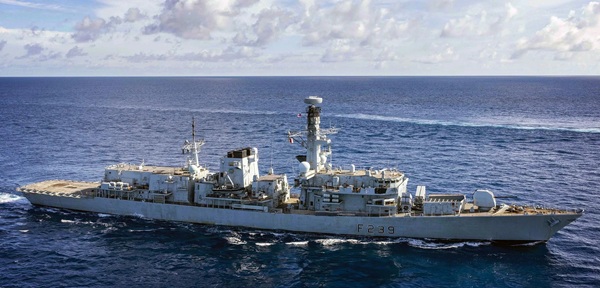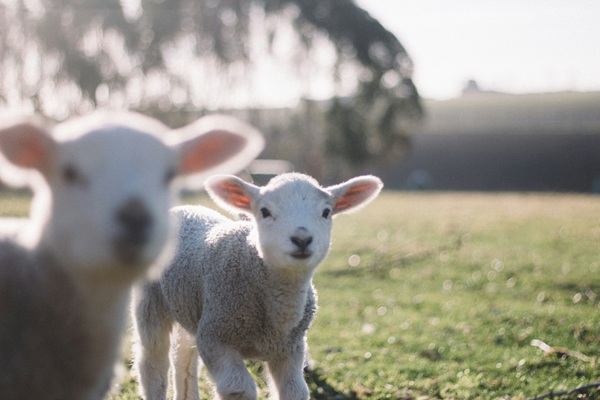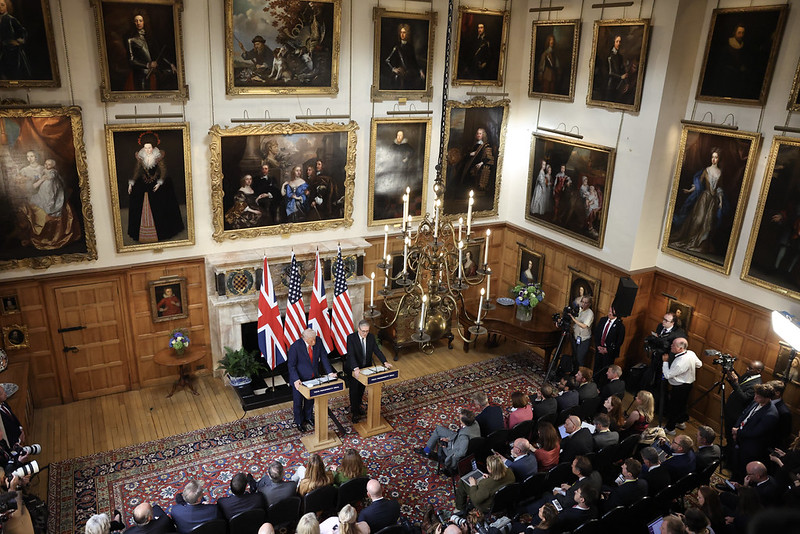1. King and Trump confirm UK-US special relationship
In a moment steeped in tradition and diplomacy, King Charles III and U.S. President Donald Trump reaffirmed the strength of the UK-US “special relationship” during a lavish state banquet at Windsor Castle. The event marked President Trump’s second state visit to the United Kingdom and served as a symbolic renewal of the historic alliance between the two nations.
A Toast to Shared History and Future Prosperity
Addressing a distinguished audience of 160 guests, King Charles delivered a speech that blended historical reflection with forward-looking optimism. He highlighted the deep-rooted ties between the UK and the US, forged through centuries of shared sacrifice, innovation, and cultural exchange.
“Anchored by the deep friendship between our people, this relationship… has made us safer and stronger through the generations,” the King said, noting the upcoming 250th anniversary of American independence
He humorously referenced George Washington’s vow never to set foot on British soil and his own ancestor King George III’s disdain for revolutionary leaders, contrasting it with today’s close kinship between the two nations.
President Trump responded with equal warmth, describing the relationship as “more than special,” and praised the UK’s role in global diplomacy, trade, and defence. He also toasted the enduring legacy of cooperation, particularly in areas of technology, energy, and security.
Trade and Technology: A Renewed Focus
The banquet wasn’t just ceremonial—it underscored the economic and strategic importance of the UK-US partnership. King Charles emphasised the nations’ collaborative achievements in nuclear science, genomics, and the internet, and pointed to new agreements in technology and innovation as key drivers of future prosperity
“Together, our scientists and engineers are shaping the world of tomorrow,” he said, referencing joint ventures that promise to boost both economies.
President Trump echoed this sentiment, reaffirming his administration’s commitment to expanding bilateral trade and investment. The UK was notably the first partner in a trade deal under Trump’s renewed presidency, a move that has already stimulated job creation and economic growth on both sides of the Atlantic.
Defence, Diplomacy, and Environmental Stewardship
The leaders also addressed global challenges, including the war in Ukraine and climate change. King Charles praised the AUKUS submarine partnership with Australia and the UK-US defence alliance as “the closest… ever known.” He also called for joint efforts to protect natural resources and ensure environmental sustainability for future generations
Trump, while known for his contrasting environmental policies, nodded in agreement as the King spoke of clean air, water, and food as shared goals.
A Relationship Forged in Fire, Renewed in Friendship
The evening concluded with a toast to the health and happiness of the American people, and a reaffirmation of the nations’ shared values: liberty, independence, and mutual respect.
For businesses and investors, the banquet signals a renewed era of cooperation, with opportunities in trade, technology, defence, and sustainability. As the UK and US look ahead to the next 250 years, the “special relationship” remains not just a diplomatic phrase—but a foundation for global leadership and economic resilience.
2. HMS Richmond visits Philippines

The United Kingdom has taken a significant step to deepen its strategic and economic partnership with the Philippines, as the Royal Navy’s HMS Richmond made a high-profile port call in Manila this September. The visit, part of the UK Carrier Strike Group’s eight-month Indo-Pacific deployment, underscores the UK’s commitment to regional security and the growing importance of the Philippines as a trade and defence partner.
A New Era of Defence Cooperation
The arrival of HMS Richmond, a Type 23 anti-submarine frigate, was accompanied by a visit from UK Defence Minister Lord Vernon Coaker. During his stay, Lord Coaker met with Philippine Defence Secretary Gilberto Teodoro Jr. and other senior officials to discuss a proposed Status of Visiting Forces Agreement (SOVFA). This agreement, once formalised, will mark a major milestone in UK-Philippines defence relations, enabling broader joint training, enhanced maritime awareness, and expanded capacity-building efforts.
The SOVFA would facilitate easier cooperation between the two nations’ armed forces, paving the way for more frequent joint exercises, humanitarian missions, and disaster response operations. The UK’s participation in the upcoming Exercise Sama Sama, a multinational maritime drill, further demonstrates its commitment to regional security and professional collaboration.
Defence Innovation as a Catalyst for Trade
Beyond defence, HMS Richmond’s visit also served as a platform to showcase British defence innovation and its potential to drive trade and industrial collaboration. An industry day held aboard the frigate highlighted cutting-edge UK defence technologies, opening doors for potential exports and partnerships with Philippine counterparts. This aligns with the UK government’s broader strategy to make defence an engine for economic growth, supporting jobs and boosting trade at home and abroad.
Lord Coaker emphasised, “The UK’s relationship with the Philippines is strong and continues to flourish. Together, we can help shape a peaceful, stable, and prosperous Indo-Pacific. The deployment of the UK Carrier Strike Group to the Indo-Pacific reflects the importance of the region to UK security and prosperity. It has been a privilege to see cutting-edge defence innovation from both the UK and the Philippines. Together, we will enhance our defence cooperation and boost our trade.”
A Strategic Trade Partnership
The Philippines is a key regional trade partner for the UK, and the visit reinforced the shared ambition to deepen economic ties. The UK’s historic increase in defence spending, coupled with its Indo-Pacific strategy, positions British businesses to benefit from new opportunities in the region. The Carrier Strike Group’s engagement with over 30 countries during its deployment highlights the UK’s global approach to security and trade.
Looking Ahead
As the UK and the Philippines move towards formalising the SOVFA and expanding joint activities, the foundation is being laid for a new era of defence and trade cooperation. For UK businesses, especially those in the defence, technology, and maritime sectors, the evolving partnership offers promising prospects for collaboration, innovation, and growth.
3. European buyers on English meat visit

Tim Marshall via Unsplash
British lamb has long been celebrated for its quality, sustainability, and heritage. This September, its reputation took centre stage as the Agriculture and Horticulture Development Board (AHDB) led a high-profile trade mission to showcase the very best of British sheep meat to key European buyers.
From September 15–17, twelve delegates from France, Germany, Portugal, and the Netherlands toured UK farms, processors, butchers, and retailers. The mission culminated in a showcase dinner, offering a taste of world-class British lamb and a deeper understanding of the production standards that underpin its excellence.
A Booming Appetite for British Lamb
The timing couldn’t be better. Figures from the first half of 2025 reveal that UK red meat exports, including offal, rose nearly 10% year-on-year to £966 million. Fresh and frozen sheep meat exports to the EU alone surged by 13%, reaching £323 million [2]. With the EU accounting for 94% of UK lamb exports, the mission reinforced Britain’s position as a trusted supplier in a lucrative market.
Gareth Renowden, AHDB’s Head of International Marketing, highlighted the strategic importance of building relationships:
“Making strong connections with people is key to helping ensure UK red meat exports thrive. Our export trade adds value of £40 per head for the sheep meat sector, and the EU remains our biggest trading partner and a key destination for British lamb.”
Quality, Provenance, and Innovation
British lamb is not just about tradition—it’s about innovation and integrity. The mission spotlighted the UK’s commitment to high welfare, grass-fed, outdoor-reared livestock, and environmentally responsible farming. These values are now being communicated more effectively through AHDB’s newly launched multilingual Quality Meat from Britain website, which provides consistent messaging around provenance and production standards across European markets.
In France, AHDB continues its partnership with Interbev to expand the Changeons l’Agneau (“Let’s Change Lamb”) campaign. This initiative focuses on smaller cuts and upskilling butchers to appeal to younger consumers—an essential move in a market where culinary preferences are evolving.
Looking Ahead: Cologne and Beyond
Next month, AHDB and British red meat exporters will head to Anuga in Cologne, the world’s largest international food trade show. This event presents a prime opportunity to build on the momentum of the September mission, forge new partnerships, and further elevate the profile of British lamb on the global stage.
Conclusion
The mission to ‘meat’ Europe’s appetite for British lamb is more than a clever play on words—it’s a strategic push to secure long-term growth, resilience, and recognition for UK farmers and producers. As trade barriers ease and demand rises, British lamb is poised to carve out an even bigger slice of the European market.
4. Palfinger opens $15M distribution hub in Illinois

Palfinger, the global leader in innovative crane and lifting solutions, has officially opened its new North American Parts Distribution Center in Huntley, Illinois—a $15 million investment designed to transform service speed and reliability for customers across the US, Canada, and Mexico.
Strategic Investment to Boost North American Service
The new 177,000-square-foot facility, located near Chicago’s major interstate corridors, O’Hare International Airport, and Rockford’s cargo hub, is set to become the central hub for Palfinger’s spare parts operations in North America. Stocking more than 60,000 parts for the company’s full product range—including knuckle boom cranes, bucket trucks, truck-mounted forklifts, service cranes, hooklifts, cable hoists, and timber and refuse loaders—the centre is expected to process up to 75,000 shipments annually.
This strategic location and scale will significantly reduce equipment downtime for dealers and customers, ensuring faster delivery and greater reliability. The facility leverages an advanced AutoStore robotic system for parts picking, enabling rapid and accurate order fulfilment and supporting Palfinger’s ambition to set new standards in service excellence.
Enhancing Customer Experience and Dealer Support
The Huntley centre is more than just a warehouse; it is a cornerstone of Palfinger’s commitment to customer-centric service. By consolidating parts operations and integrating with Palfinger’s growing online ordering system, the company aims to provide seamless support to its dealer network and end-users. The investment also complements innovations in service delivery, such as virtual reality training and an expanding mobile service fleet, all designed to keep customer equipment operating at peak performance.
“Our focus is simple: get customers what they need, when they need it, and keep their equipment working at peak performance,” said Ismael Daneluz, Vice President of Sales and Service for North and Latin America.
Supporting Growth and Market Leadership
The opening of the Huntley centre coincided with the 2025 Palfinger North America Dealer Conference, bringing together nearly 200 dealers, partners, and company leaders under the theme “Connected by Service, Driven by Excellence.” The event underscored Palfinger’s ambition to double its global parts and service revenue by 2030 and to reach $1 billion in North American revenue by the end of the decade.
Until now, North American customers were served from four locations: Trenton (New Jersey), Niagara Falls (Canada), Oklahoma City, and Council Bluffs (Omaha). The new Illinois facility consolidates and enhances Palfinger’s logistics capabilities, further strengthening its position as the region’s top provider of lifting solutions.
A Commitment to the Future
Palfinger’s investment in Huntley is a clear signal of its confidence in the North American market and its commitment to delivering world-class service. As CEO Andreas Klauser stated, “The Huntley facility is a major investment in keeping our customers up and running. It’s about speed, reliability, and demonstrating our commitment and confidence to this region. It’s also bringing our global standard of service even closer to our dealers and customers.”
With this new centre, Palfinger is poised to support the growth of its dealer network, enhance supply chain resilience, and deliver on its promise of service excellence for years to come.
5. Switzerland signs free trade agreement with Mercosur

In a significant step toward deepening economic ties between Europe and South America, Switzerland has officially signed a comprehensive free trade agreement with the Mercosur bloc, comprising Argentina, Brazil, Paraguay, and Uruguay. The deal, concluded under the umbrella of the European Free Trade Association, also includes Iceland, Liechtenstein, and Norway.
A Strategic Economic Milestone
The agreement, signed in Rio de Janeiro on September 16, 2025, follows eight years of negotiations and 14 formal rounds of talks. It grants Swiss exporters access to a market of over 270 million consumers and is expected to generate customs savings exceeding CHF 155 million annually.
Once fully implemented, approximately 96% of Swiss exports to Mercosur countries will be exempt from customs duties, significantly enhancing the competitiveness of Swiss industries such as pharmaceuticals, precision instruments, and machinery.
In 2024 alone, Swiss exports to Mercosur exceeded CHF 4 billion, marking a 32% increase compared to 2014.
Balancing Trade and Sustainability
Beyond tariff reductions, the agreement includes robust provisions on sustainable development, environmental protection, and labor rights. A supplementary declaration outlines commitments to forest conservation, biodiversity, and sustainable agriculture.
This emphasis on sustainability reflects Switzerland’s broader trade strategy, which seeks to align economic growth with environmental responsibility. The Swiss government has highlighted that the deal avoids disadvantaging Swiss exporters in light of the EU’s own agreement with Mercosur, concluded in 2024.
Agricultural Sensitivities and Domestic Concerns
To address domestic concerns, particularly from the agricultural sector, Switzerland has negotiated 25 bilateral import quotas for sensitive products such as beef and wine. These quotas are limited—typically under 2% of national consumption—and align with current import volumes, aiming to minimise disruption to Swiss farmers.
Nevertheless, Swiss agricultural groups have expressed concerns about increased competition and are calling for support measures to safeguard local producers and maintain agricultural diversity.
Next Steps: Parliamentary Approval and Potential Referendum
Before the agreement can enter into force, it must be ratified by the Swiss Federal Council and approved by Parliament. A public referendum remains a possibility, echoing the precedent set by the 2021 Indonesia trade deal, which narrowly passed following public debate.
A Broader Geopolitical Signal
This agreement not only strengthens Switzerland’s trade footprint in Latin America but also signals a broader commitment to open markets and multilateral cooperation amid rising global protectionism. It positions Switzerland as a proactive player in shaping sustainable and inclusive trade frameworks for the future.
6. Singapore & Egypt sign broad cooperation deals

In a significant move for global trade and South-South cooperation, Singapore and Egypt have agreed to explore the feasibility of a free trade agreement, marking a new chapter in their longstanding partnership. The announcement came as Singapore President Tharman Shanmugaratnam and Egyptian President Abdel Fattah al-Sisi met in Cairo, where they also witnessed the signing of seven wide-ranging memoranda of understanding designed to deepen bilateral ties.
A Timely Initiative for Two Strategic Hubs
Both leaders described the FTA initiative as “timely,” aiming to leverage the complementary strengths and strategic locations of Singapore—a global trade and logistics hub—and Egypt, the gateway between Africa, the Middle East, and Europe. Singapore currently has 28 implemented FTAs, and the potential agreement with Egypt would further enhance market access, investment flows, and economic cooperation between Southeast Asia and North Africa.
President Tharman highlighted Singapore’s belief in Egypt’s economic potential, noting that Singapore has been among the largest Asian investors in Egypt over the past decade. Singapore’s direct investment in Egypt stands at around $530 million, while Egypt is Singapore’s eighth-largest trading partner in Africa, with bilateral trade in services valued at over $1.3 billion as of 2023.
Broad-Based Cooperation: From Ports to Food Security
The leaders’ summit was marked by the signing of seven MoUs covering a spectrum of sectors:
- Maritime and Port Development: Cooperation frameworks will support the digitalisation and modernisation of Egypt’s ports, including a feasibility study to transform West Port Said into a smart port.
- Economic Partnership and MSMEs: Agreements aim to boost capacity building, digitalisation, and support for micro, small, and medium enterprises (MSMEs) and startups.
- Healthcare and Social Protection: The two countries will collaborate on healthcare innovation, non-communicable disease prevention, and social services, including women’s and family development.
- Agricultural Innovation: Joint research will focus on developing climate-resilient rice varieties to enhance food security in both regions.
- Government Capability and Training: Initiatives will foster public sector leadership and governance through knowledge exchange and training programs.
A Partnership Rooted in History, Looking to the Future
Egypt was the first Arab country to recognise Singapore’s independence in 1965, and the two nations will celebrate 60 years of diplomatic relations in 2026. The leaders reaffirmed their commitment to a “deeper and more multifaceted partnership,” with President Tharman inviting President Sisi to Singapore for the anniversary celebrations.
President Sisi, for his part, emphasised Egypt’s openness to Singaporean investment and called for greater private sector engagement. An Egyptian-Singaporean business forum is also planned to further catalyse commercial ties.
Navigating Global Challenges Together
Both presidents underscored the importance of open trade and cooperation in an era of rising protectionism and global uncertainty. Their joint statement stressed that such partnerships are vital for building resilient economies and fostering peace and stability in their respective regions.
As Singapore and Egypt embark on this new phase of collaboration, the potential FTA and the broad cooperation agreements signal a shared vision for sustainable growth, innovation, and prosperity—setting a benchmark for cross-continental partnerships in the 21st century.
Featured image Ellesborough, United Kingdom. Prime Minister Keir Starmer hosts US President Donald Trump and his wife First Lady Melania at Chequers as the President is hosted by King Charles III for a state visit. Picture by Simon Dawson / No 10 Downing Street







